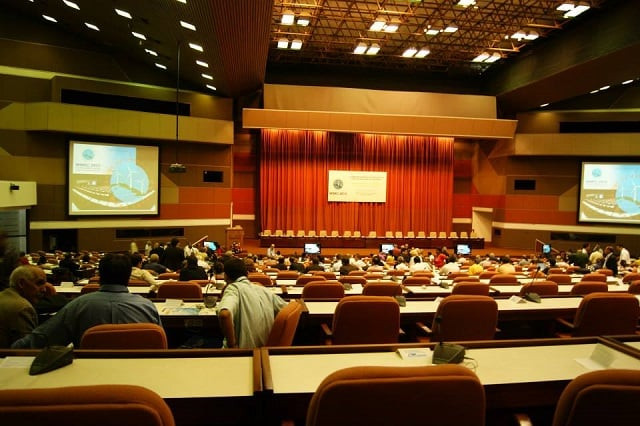Federal govt promises new national energy policy
Efforts afoot to increase the share of renewable electricity generation to 30% by 2030, says federal minister

17th World Wind Energy Conference-2018. PHOTO: wwec2018.com
The assurance came from special assistant to the prime minister on power sector, Shahzad Qasim, while speaking as the chief guest at the last session of 17th World Wind Energy Conference-2018. The three-day conference organised by the World Wind Energy Association (WWEA) concluded on Friday.
Qasim said that the present government, in collaboration with the concerned stakeholders of the power sector, would strive to increase the share of renewable power generation up to 20% of the national energy mix.
He said the present government fully realised the scope of renewable energy which was the cheapest source of power generation.
Govt asked to switch to renewable energy
He assured that the government would develop a national energy policy for the country in the shortest possible time to undo mistakes of the past regime, which had stonewalled the growth of the renewable energy sector.
"We may take some time to unveil the new energy policy but it will be devised in a manner that once implemented it would not attract criticism from the concerned quarters," he said.
Qasim expressed appreciation over the fact that despite all the obstacles posed by the past regimes, today wind energy sector generates more than 1,000 Megawatts of electricity.
In a special audio message for the audience of WWEC, Federal Energy Minister Omar Ayub Khan reiterated the resolve of his government to make alternative power generation a larger portion of energy basket of Pakistan. "We sincerely believe that the renewables will make the energy matrix, especially the cost of energy, more competitive for industries and energy consumers in Pakistan".
He expressed the resolve of his government to attract foreign direct investment in the energy sector of Pakistan, stating that all state policies would be proactive in this regard.
The federal minister assured that the federal government would soon come up with a new alternative energy policy for the country.
Also speaking via a video link at the conference, member (Energy) of Planning Commission of Pakistan, Tahawar Hussain, assured that the government's policy would give top priority to renewable energy resources for further increasing power generation capacity of the country.
He said that planning was afoot in the power sector of the country to increase the share of renewable electricity generation to 30% of the national energy mix by the year 2030.
WWEA Secretary General Stefan Gsanger said that given its skilled and qualified engineers, Pakistan clearly had the ability to increase its renewable power generation to the extent being done in countries of Europe like Denmark and Germany.
"For this, all you need is a clear direction and clear political decision-making. You can also learn from the experiences of the neighbouring countries like China and bring the required expertise and technologies from there. No further excuse is acceptable in this regard," he said.
He said that Denmark and Germany, despite tremendously increasing their energy dependency on wind and solar power, had an average electricity blackout time of just 10 minutes a year.
Gsanger noted that at present wind power accounted for five percent of the electricity being generated globally.
Pakistan Alternative Development Board (AEDB) Chief Executive Officer (CEO) Amjad Ali Awan said that renewable energy generation in the country in the last couple of years, during his tenure at the AEDB, had increased from mere 264 MWs to 1,164 MWs.
Danish Iqbal, an investor in the wind energy sector of Pakistan, suggested that the government should allow the private sector to invest in the electricity transmission sector while making it responsible to fully run and manage it. He said that such a decision would not only decrease losses of transmission lines in the country but would allow maximum expansion of the renewable energy sector.
He said that National Trans-mission and Dispatch Company had presented with such a proposal but for last five years there had not been any development in the area. "A very bankable concession document of Matiari-Lahore Transmission Line is available in the country and we have to make progress in this direction while subscribing to it".
A resolution was also read out at the conclusion of the conference, which emphasised that wind and renewable energy were broadly understood as lowest-cost solutions which have the potential to foster sustainable economic growth, to overcome energy poverty, and to strengthen resilience, autonomy and prosperity of communities.
Pakistan asked to produce 30% of power from renewable sources
The resolution calls for creating fair market conditions including removing all direct and indirect subsidies from fossil energies.
It recognises that there are still manifold barriers in developing countries that hinder the fast deployment of wind power, including unreliable remuneration systems, bureaucratic barriers and shortage in grid capacity to evacuate electricity produced at wind farms. The conference urges governments to counter these barriers effectively.
"The conference understands that realising the huge potential of wind and the other renewable energies requires clear, reliable and positive policies. The lack of regulatory and political continuity has a harmful impact on the sector across the supply chain, from manufacturing, planning, construction, operation up to the finance," said the resolution.
Later, President WWEA Peter Rae awarded World Wind Energy Award-2018 to Honorary Vice President of the association, Air Marshal (Retd) Shahid Hamid, to recognise his services in promoting renewable energy in Pakistan.
Published in The Express Tribune, December 1st, 2018.



















COMMENTS
Comments are moderated and generally will be posted if they are on-topic and not abusive.
For more information, please see our Comments FAQ